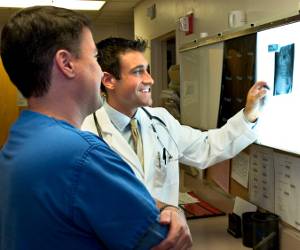If the idea of college is overwhelming, rest assured that getting a degree doesn't have to mean spending years in a classroom. According to government data, there are a number of in-demand careers requiring less than a bachelor's degree. In fact, 16 of the 30 fastest-growing jobs right now, according to the Bureau of Labor Statistics, require an associate degree, certificate or on-the-job training. Less training doesn't mean you have to settle for less money, however. A number of these jobs offer the potential for a solid income as well.
Health care jobs expected to grow rapidly
According to the BLS, health care is one of the largest industries in the country. In 2008, it provided 14.3 million jobs and is expected to generate another 3.2 million from 2008 to 2018. So it isn't surprising that many of the high-demand jobs of the future are in this field. As the U.S. population ages and medical needs increase, demand for health care providers in some areas is expected to surge.
For job seekers, the best news about the explosive growth in health care is that in many fields, you can be ready to enter the workforce in two years or less. While doctors and researchers need advanced degrees, most health care support occupations require only an associate degree or completion of a certificate program.
Be aware high-growth careers don’t always equate to high salaries, however. For example, the need for home health aides is expected to increase a staggering 50 percent from 2008-2018, but workers in this field earn mean annual wages of only $21,760 according to the BLS. Don't settle for a relatively low-paying health care job when a little training could have you ready for one of these hot jobs instead.
6 jobs in health care that require an associate degree or less:
 | 1. Registered nurseThe BLS reports registered nurses (RN) make up the largest health care occupation in the country. There are 2.6 million jobs available, and 60 percent of RNs work in hospitals. The great thing about this career path is its flexibility. You can become a registered nurse with either an associate degree or a diploma from an approved nursing program. Then, once your career is established, you can move into more advanced positions with additional education and certification.
|
 | 2. Occupational therapist assistantOccupational therapist assistants help provide rehabilitative services to individuals who have difficulty performing daily tasks because of an injury, illness or impairment. Assistants may help with record keeping, billing insurance and supervising therapeutic exercises.
|
 | 3. Radiation therapistRadiation therapy is a key treatment for cancer patients, and radiation therapists are responsible for aligning and operating the machines that provide this treatment. Since therapists work directly with those battling cancer, compassion and empathy are essential traits for anyone entering the field.
|
 | 4. Fitness trainer and aerobics instructorIf the gym is one of your favorite places, consider a career as a fitness trainer or aerobics instructor. You don't need a degree to work as a fitness trainer, but you do need certification. Depending on whether you want to teach a specific aerobics class or work as a personal trainer, certification courses can run from a few days to a few years.
|
 | 5. Skin care specialistThe growing popularity of both medical and spa skin care treatments is driving rapid growth in this field. Individuals working in skin care may give facials, full-body treatments and head and neck massages. Some skin care specialists also apply make up for their clients.
|
 | 6. Dental hygienistAnother high growth occupation is that of dental hygienists. These hard working professionals are the ones who complete teeth cleanings and often instruct patients on the basic of good oral health. As demand for preventative dental care grows, hygienists are completing tasks previously reserved for dentists, the BLS reports.
|
If you are ready for a new career, remember that not every occupation requires a bachelor's degree. You can be ready for these hot jobs in two years or less. So what are you waiting for?